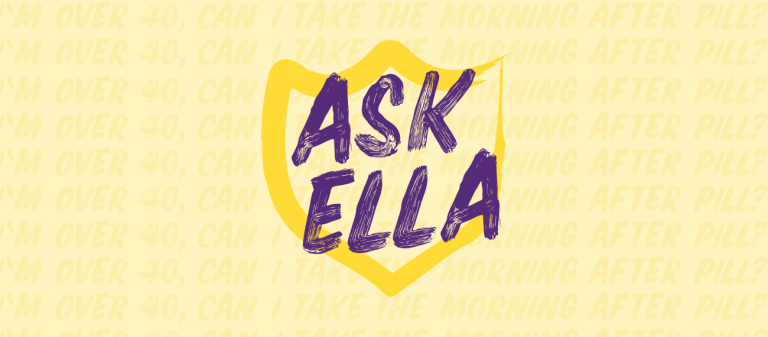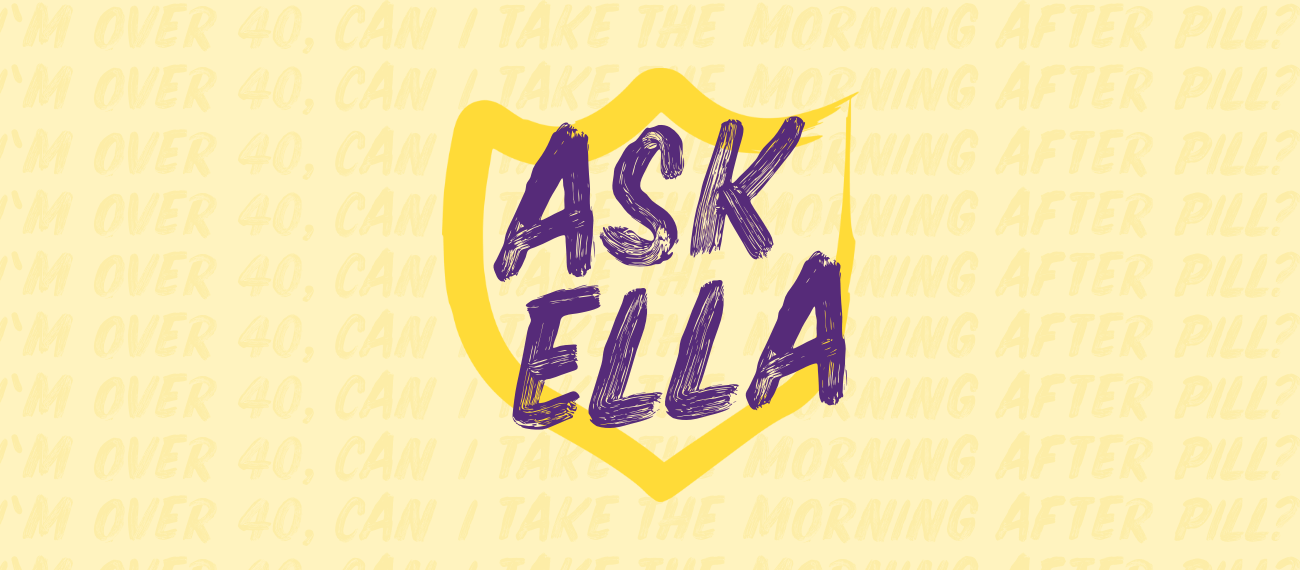When it comes to sex and contraception, the spotlight is usually on younger women. But in reality, unplanned pregnancies are still possible for women and people with uteruses in their 40s and above. Accidents can happen to anyone and for as a long as a person still requires contraception (i.e. until they reach menopause), so in the event of unprotected sex or a regular contraceptive failure, emergency contraception – like the morning after pill – can still be used.
No matter what stage of life we find ourselves in, we all deserve a worry-free sex life. Admittedly, there are a few extra factors to be considered the older we get based on our changing personal and medical needs, but that’s why we’re here to tell you exactly what you need to know.
Before we begin…
There comes a time in life when a person’s body stops producing as much oestrogen and menstrual periods stop: this is known as the menopause. Someone is said to be “in menopause” when they haven’t had a period for 24 months in a row if under 50, and 12 months in a row for those over 50.
Generally speaking, contraception for preventing unplanned pregnancy should be continued until menopause. If, for whatever reason, menopause cannot be confirmed, contraception should be continued until the age of 55. But it’s always a good idea to seek advice from your GP if you’re at all unsure.
Remember, just because menopause has hit, doesn’t mean you need to take a pause on having a good – and safe – sex life.
The Morning After Pill
If you’ve experienced unprotected sex or a contraceptive failure, there are emergency contraceptive options to prevent pregnancy. There is no upper age limit for emergency contraception if the person has not reached menopause yet.
Hormonal emergency contraception (often referred to as the morning after pill) can be taken to help you avoid unplanned pregnancy if you have had unprotected sex or experienced contraceptive failure. There are two main types of emergency contraceptive pills available in the UK: emergency contraceptive pills containing ulipristal acetate and those containing levonorgestrel.
ellaOne® contains ulipristal acetate and is the UK’s preferred morning after pill** for preventing pregnancy. Ulipristal acetate is recommended by the Faculty of Reproductive and Sexual Health as the most effective ingredient for the emergency contraceptive pill. In a clinical trial* it has been shown to be 2.5 times more effective than levonorgestrel when taken within 24 hours of unprotected sex.
*Based on sales data. Verify at ellaone.co.uk/verify
It’s important to be aware that no method of contraception, be that a regular or emergency contraceptive, is 100% effective. The morning after pill will not work if ovulation has already occurred because this method of contraception works by delaying ovulation.
ellaOne® can be taken up to 5 days after having unprotected sex, but is most effective when taken as soon as possible. You can purchase the ellaOne® morning after pill over the counter or online at ellaOne® Direct for discreet delivery straight to your door.
There are lots of myths that taint the general perception of the morning after pill. Check out our article debunking the most common myths here.
It’s important to highlight that the emergency contraceptive pill is for emergency use only and can’t be used as a regular contraceptive. If you’re interested in other regular contraceptive options, read on.
The IUD
Next, there’s the intrauterine device (IUD), which is a small T-shaped plastic and copper device that’s inserted into the womb by a medical professional and releases copper to help prevent pregnancy. As with ellaOne®, the IUD can also be fitted up to 5 days after having unprotected sex.
Given the natural decline in fertility with age and the lifeline of an IUD (5-10 years), if an IUD is inserted over the age of 40 years then it can remain, without being changed, until menopause. The IUD isn’t just a method of emergency contraception, but it also falls within the category of LARCs.
LARCS
LARCs stands for Long-Acting Reversible Contraception. They’re most effective at preventing pregnancy because, unlike the pill, you don’t have to remember to take them every day.
As well as the IUD, other LARCs include the implant and IUS (intrauterine system). All of these are more than 99% effective. There’s also the injection, which is 94%-99% effective.
However, it’s important to note that there’s some concern over the contraceptive injection reducing bone mineral density. So women and people with uteruses over 40 with health concerns such as a family history of osteoporosis should seek advice from their healthcare provider.
Barrier methods
When it comes to contracting STIs, age really is nothing but a number; and condoms are the only contraceptive method to protect against STIs.
Male condoms cover the penis while female condoms are inserted into the vagina to provide a barrier between the vagina and penis during penetration. Both types protect against pregnancy and STIs.
There are also these things called dental dams that are essentially a thin sheet of latex or polyurethane that cover the vagina or anus during oral sex and reduce your risk of exposure to STIs.
You can get condoms for free from your sexual health clinic or purchase them from many shops and pharmacies.
Contraceptive Pills
The two types of contraceptive pill are: the combined pill, which contains a synthetic form of oestrogen and a synthetic form of the hormone progesterone (called a progestogen); while the second type is a progestogen-only pill (called POP or “mini pill”), which just contains progestogen as the active ingredient.
Both types of contraceptive pills are 99% effective at preventing pregnancy when used correctly.
There are two oral contraceptive pill options newly available over the counter
without prescriptions too. Check out our sister site to find out about Hana® – a progestogen only pill that you can purchase online or at a pharmacy.*
Hana® 75µg film-coated tablets contain desogestrel and is an oral contraception for women of child bearing age to prevent pregnancy. Always read the instructions on the package leaflet carefully.
However, there are a couple of things to note about the contraceptive pill. Progestogen-only pills are often suitable for people who have high blood pressure, have a higher BMI, have a history of blood clots or are over the age of 35 who smoke.
It’s important to be clear that the combined pill may not be suitable for people with these health conditions as they contain oestrogen. But it’s best to talk to your pharmacist or GP who will be able to advise on this. Did you know you can buy some progestogen-only pills over the pharmacy counter (or online) without a doctor’s appointment? Find out more here.
Sterilisation
Female sterilisation is an option to permanently prevent pregnancy. The fallopian tubes are blocked or sealed to prevent the eggs reaching the sperm and becoming fertilised. In many cases it can be reversed, but it is a very difficult process and there’s no guarantee you’ll be fertile again. So for this option, you’ll want to be sure that it’s definitely the decision you want to go with.
The Centres for Disease Control and Prevention found that those choosing female sterilisation increase with age. About 1 in 20 women aged 20–29 (4.2%), 1 in 5 women aged 30–39 (21.6%), and nearly 2 in 5 women aged 40–49 (39.4%) were relying on female sterilisation for contraception.
A vasectomy (male sterilisation) is a surgical procedure which is designed to stop sperm getting into the semen, i.e. the fluid that is ejaculated when a man or person with a penis cums. The tubes that carry the sperm into the semen are cut or blocked, so that when the person with the penis ejaculates there will be no sperm in it and it cannot fertilise an egg.
After a vasectomy, you will need to use contraception for 8-12 weeks because sperm may still be present. People with penises are more likely to be approved for a vasectomy if they have already had children or if they are over the age of 30.
Overall…
Ultimately, there is no “one size fits all” when it comes to contraception. Everyone is different, and it’s important to talk to your pharmacist or doctor about any health concerns, medications or anything else they should know so they can help you make an informed decision.
You deserve a great sex life which fufills your needs, and it’s important that you’re clued up about how your body works and what options are available to you so you can feel empowered and in control. Still have some questions? Check out our other content here or get in touch using the hashtag #AskElla.
ellaOne® 30mg film-coated tablet contains ulipristal acetate and is indicated for emergency contraception within 120 hours (5 days) of unprotected sex or contraceptive failure. Always read the label.




